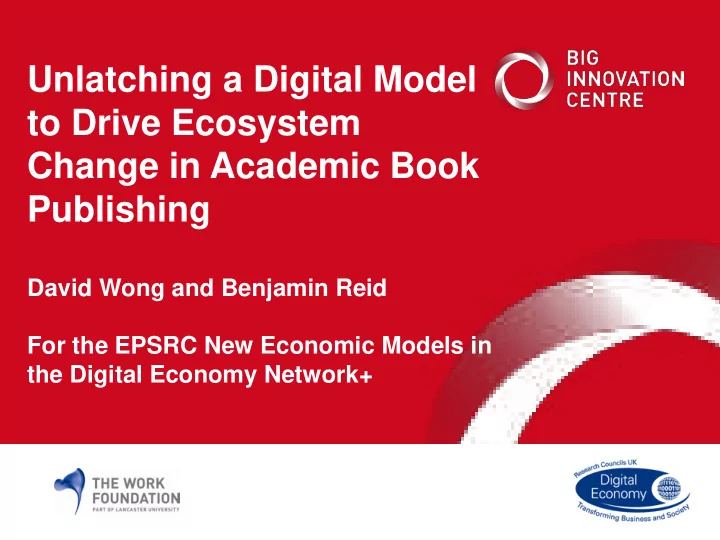

Unlatching a Digital Model to Drive Ecosystem Change in Academic Book Publishing David Wong and Benjamin Reid For the EPSRC New Economic Models in the Digital Economy Network+
Disruption of the Academic Publishing Market • UK Publishing • Has experienced a steady decline in recent years, from £3.52 billion in 2007 to £3.12 billion in 2011, and is expected to be worth only £2.96 billion by 2016. • UK Academic publishing • The academic and professional subsector in the UK was valued at £684 million in 2011, or 21.9% of the entire book publishing sector, which was a decline of nearly 3% from the previous year • UK Academic monograph publishing • Over the past two decades, sales of academic monographs have shrunk by 90%, causing prices to rise dramatically as fewer copies are sold. (Willinsky, 2009)
Academic Monographs (in the Arts and Humanities): Squeezed on all sides? • Shrinking library budgets • High origination costs • … and rising costs per unit • Digitalisation • But… under -served markets • Unit purchasing cost rises have priced out many libraries, particularly in emerging economies, just as digitalisation made them potentially much more accessible.
The pre-Knowledge Unlatched model Academics as producers and consumers (not remunerated through system) Library Publisher Library Publisher … Library Publisher Publisher Library Publisher Library Publisher Library
The Knowledge Unlatched model 2. KU sends out information 1. Publishers submit titles to KU to member libraries Libraries Publishers 3. Member libraries select 5. KU places orders with titles and send orders to KU publishers and pays publishers 4. KU aggregates orders, calculates title fees and collects money from libraries 6. Publishers make available basic digital file to libraries, and offer enhanced versions and/or print copies to libraries at significant discounts (negotiated individually)
Single unit example Old print model for a typical monograph Outcome: no-win situation where although libraries obtain print copies, each has to pay £50 per copy, while the publisher incurs a £6,000 loss. £ £ 400 copies sold to libraries @ average £50 per unit 20,000 Fixed origination costs 8,000 Variable printing & production, marketing, distribution, royalties, suppliers 18,000 26,000 Profit/loss on the monograph (6,000) The KU model for a typical monograph Outcome: win-win situation where libraries obtain basic digital file of the monograph at 60% (assuming 400 libraries) or 73% (assuming 600 libraries) reduction, while the publisher covers fixed costs. Libraries can variably opt for value-added digital versions and/or print copies at significant discounts. £ Fixed origination costs* 8,000 400 member libraries pooling to meet origination costs @ £20 each 8,000 600 member libraries pooling to meet origination costs @ £13.33 each 8,000 Profit/loss on fixed costs 0 * Publishers may also build in a modest margin on origination costs so as to incentivise publication.
KU as a hybrid ‘market making’ model KU is notable as the integration of multiple models into the overall, which we call a market-coordinating model • Elements of crowdfunding • Cooperative model of pooling and scale • A Community Interest Company seemingly balancing commercial interests of different groups • (The role of the key individual?) • Elements of a freemium model. • Aspects of a licence fee model
Where do we go with this? • KU is being incubated by the Big Innovation Centre • A research programme on the model alongside the experiment co- ordinated by Dr Lucy Montgomery • Market Making , Andrew Sissons and Spencer Thompson (2012) • http://www.biginnovationcentre.com/Publications/26/Market-Making • Data is the next frontier, Analytics the new tool , David Wong (2012) • http://www.biginnovationcentre.com/Publications/21/Data-is-the-next-frontier-Analytics-the- new-tool • New Economic Models in the Digital Economy bid • New models for optimisation technologies using crowd-sourced academic research communities (with UCL)
Recommend
More recommend